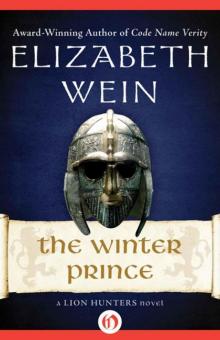- Home
- Elizabeth E. Wein
A Coalition of Lions Page 7
A Coalition of Lions Read online
Page 7
“Well, I am not Abreha!” Priamos cried out, so impassioned he was near to weeping.
“Yet you insist on undermining my authority! You conspire with the princess who is to be my bride, you run riot in my court, and then you dare argue with me! I do not like these damned colobus any more than you do—”
“So get rid of them!”
Constantine struck him a third time across the face, more coldly, as though in an effort to bring him to his senses. Priamos staggered, and was held up by his guards.
“I am going to see you bound in this place as long as it takes to repair the walls,” Constantine said, his voice hard and controlled. “I do not care how noble a prince you are; I will not let you test my stewardship with such brass insolence. Let everyone see what you have done.”
“My lord Ella Amida,” begged Ityopis, “in God’s name use reason in your punishment of him.”
“Am I dealing with a reasonable man? I would as soon have him flayed! Look about you!”
And the Golden Court was a ruin. Water leaked from a crack in the fountain wall where the marble had been torn out, monkeys roared and barked in the ceiling, potted trees lay uprooted and overturned, marble fragments strewed the floor.
“At least give him a choice,” said Wazeb in his light, casual way.
Constantine pressed his lips together tightly; his nostrils flared. “He shall be chained here so long as it takes to mend the walls. Three days, perhaps. I do not have it in me to be gentler than this.”
Priamos winced and shrank as though he had been struck again. “Three—” He swallowed, and bit at his lower lip. “Three—” Then he seemed to retch, as though the very words he tried to speak were so loathsome that he could not hold them in his mouth. “Three years or three minutes, it is all the same to me. I would sooner be flayed.”
Constantine paused for a long moment, and then said levelly, “Would you?”
“Yes.” Priamos answered without hesitation.
“A choice,” repeated Wazeb.
Constantine sighed and glanced at Ityopis. “Just so. Ras Priamos, if you will not be bound here, then you will take a score’s lash stripes on each palm. Choose.”
“My God, Constantine,” I cried out. “Only look at his hands!”
Priamos looked down at them himself, as if noticing for the first time the damage he had done them. He could not raise them, because the guards had hold of his arms.
“Go send for a whip,” he said stubbornly.
Constantine sighed again, and nodded to the butler, who left the room. I climbed down from the pool’s edge, sick at heart.
Ityopis begged fervently, “Grant the small courtesy, then, that if he takes this beating, let that be the end of it. Let this not be spoken of over and over and held as an example of his insurrection. Let it pass as an act of thoughtless passion, finished on both sides. We are all weary of the winter rains.” He stopped to draw breath. “Let me see to the repairs.”
“All right,” said Constantine, then snorted. “The brothers Anbessa, a coalition of lions, indeed! You are a nest of scorpions.”
The butler returned. He gave the whip to Constantine and asked to be dismissed.
“All right. Send for the animals keeper; we need these monkeys caught.”
“Ah, let me come with you,” said Wazeb. “I like the animals keeper.” They left together. I stared after the boy, hating him.
“My lord Ella Amida—”
The three soldiers spoke nearly as a unit.
“Your permission to return to—”
“I should be training—”
“We are needed—”
Constantine cut them off. “I need one of you here.”
The three glanced at one another. Then, by some internal decision of their own, one of them stepped forward determinedly and took the whip from Constantine. The other two soldiers turned and saluted Priamos on their way out.
Ityopis said politely, “You do not need an audience, lord,” and turned on his heel also.
“Ras Priamos,” said Constantine.
Priamos knelt between his guards. His lip was bleeding. He held out one hand, palm up, as though holding something precious and invisible in its cup: as he had held out his hand to me when he offered me my passage to Aksum.
“Peace to you, Priamos Anbessa,” I said levelly in Ethiopic, and followed Ityopis.
I heard the first swish and crack before I had left the Golden Court. Abandoning dignity, I fled with my hands over my ears before I heard anything more.
Ityopis was ahead of me, shuddering in the corridor. He turned to me and offered me his arm: peacemaker, Priamos had called him.
“I stand amazed that martinet finds any man ready to administer his punishments,” he gasped. “Half the soldiers in this city fought under my brother in Himyar. They’d cut out their own hearts to spare him. Mother of God, to threaten him with chains! Constantine can have no idea what it is to begin life on Debra Damo. Any one of us would have chosen as Priamos did, given such choices.”
“Priamos told me of Mikael’s chains,” I said.
“Mikael’s chains!” Ityopis gave a hoarse bark of laughter, like a cough. “Mikael’s! Ai! And did he tell you of his own? How he and Hector were fettered back to back for four nights, the time they got a spear for Mikael? Four nights they lay in a pit with the madman. They took it in turns sleeping so they might constantly watch him; they nearly skinned themselves trying to break free. Priamos still carries the marks left by the irons.”
Ityopis’s words struck me like a blow to the chest, stopping my breath. Priamos had given me no hint that he had taken part in Hector’s scheme.
“He speaks with all the careful government of a rock slide,” Ityopis uttered bitterly. “‘Go send for a whip’! Small wonder our mother names him hornbill.”
Constantine came storming out of the Golden Court.
“Let us talk for a minute, Goewin.”
He pulled my arm away from its link with Ityopis’s elbow, and took me roughly by my wrists. He held my hands up, imprisoned, as he spoke. I was nearly as tall as he, but I was not as strong. And I would not humiliate myself by struggling with him. I stood struck with frost, unmoving and unyielding.
“Explain a thing to the princess for me, Ras Ityopis,” Constantine said coldly. “She has more Ethiopic than any of us guess. Tell her about the behavior of coalition lions.”
Ityopis protested in a low voice, “My lord, I do not understand—”
“Explain to her why the brothers Anbessa are named a coalition.”
I stood between them in the hall, held captive in Constantine’s hard grip, while Ityopis reluctantly obeyed the viceroy’s order and explained to me the social habits of lions.
“Male lions form lifelong allegiances. Not with their mates, but with one another. They may leave a pride, they may leave their lionesses and cubs, or a rival coalition may send them off. But an allied group of males stays together, and hunts together, and fights together. Coalition lions will defend their comrades to the death. They are more faithful to the members of their coalition than to their mates or their kits.”
“You have not yet explained the brothers Anbessa,” Constantine reminded him.
Ityopis swallowed. “We are a coalition of lions,” he said in a low voice, “because it is said that any one of us will defend another to the death, as do brotherhood lions. Sir,” he said, turning to Constantine with his head bowed, “my lord, Abreha was never one of us. He is seventeen years my senior. Priamos had never laid eyes on him until the carnage at al-Muza. Abreha is not—”
“He slew the emperor Caleb’s eldest son, but he set Priamos free unscathed. When a coalition takes over a pride, they drive out the existing coalition and kill their cubs.”
Ityopis dared to protest, “Priamos is not Abreha!”
“You, Ras Ityopis, you tread a very narrow path, and my ministers and I can find no fault in you. But Priamos—”
Constantine dug his
nails into my wrists. I clenched my teeth and did not flinch.
“You did not want to see him whipped,” he said to me softly.
“No one did! Even your young imperial catspaw, even Wazeb made an excuse!”
“Now listen, Goewin: I will not have you inciting Priamos again.”
“God help me, I won’t,” I swore ardently.
“You will not. I will see to it. I will provide you with a guard. They will stay with you here in the New Palace, and ensure you do not come anywhere near him.” He paused. “You’ll be thankful to find an imperial escort waiting for you in the street when you venture out alone; you will keep out of harm’s way as well as out of trouble. You will not need protection within the walls of Kidane’s villa, of course, but it will be pleasant for you to be able to walk about the city without fearing a ragged flock of Himyar veterans begging at your heels.”
This was entirely within his jurisdiction. I bit down hard on the protests that rose in my throat, and said only, in a voice like ice:
“If I may take a hostage, so may you.”
“You are my betrothed, not my hostage,” said Constantine. “And Wazeb is my ward. It is Priamos who is my catspaw. Cross me again, Goewin, and I swear I will find a way to use it against him.”
He dropped my wrists, at last, disdainfully.
“Lij Telemakos Meder, heir to the house of Nebir; Ras Priamos Anbessa, heir to the house of Lazen. How many more will you place in jeopardy? Your proud will may soon determine the fate of half the Aksumite imperial court,” he commented, and blew angrily on his way.
CHAPTER VII
Prisoners
I DREAMED I WAS trapped in a deep well full of chained lions, and I watched Telemakos free them one by one as he pulled their iron chains out of the stone walls. Don’t do that, I kept telling him, and he answered: I’m not afraid of lions. Blood flew from his golden fingers like drops of water. I woke all Kidane’s household, screeching.
I dreamed the Golden Court was littered with broken glass in gleaming colors, like the shards with which Lleu had once mended the mosaic floors of our villa at Camlan. Priamos chased lion cubs over the bright slivers on bleeding feet, while I apologized to Constantine for the stained floor.
I dreaded sleep. I sat late in Turunesh’s sitting room, listening to the running gutters, reading by the ethereal light of her glass ceiling lamp.
The young men who protected me in the street were shy and quiet, serious and disciplined. Constantine never sent the same collection two days running. I was hard pressed to learn any of their names; they would not look at me. They stared straight beyond me as we marched together through Aksum’s plazas and markets, their spears bristling, daring anyone to come near. There was always a group of four waiting for me outside Kidane’s gate, an imposing group of handsome spearmen. Passersby stared. I did not like to make a spectacle of my hosts.
Kidane’s mild comment was: “Our first British ambassador was a more subtle suitor.”
“He was as persistent,” said Turunesh.
When I tried to climb the grand stairway leading to the upper stories of the New Palace where Priamos was kept prisoner, I met with the same blank-faced, apologetic guards that waited for me in the street.
“Remember me to Ras Priamos,” I said to them, feeling both furious and pathetic. I said it also many times to Halen, and Ityopis, and Candake; and once, in desperation, I sent Telemakos as my message bearer, and suffered a punishing few hours of frantic guilt and worry while Telemakos took advantage of this unanticipated release from his own bondage. I never saw Priamos myself, no matter where I went.
And this went on for weeks.
Winter was drawing to an end. The rain grew less constant, then erratic, then stopped altogether. It was September, the Aksumite new year, and the sloping fields around the city exploded in a blaze of golden asters.
“Would you like to come to Adwa with us?” Turunesh asked me, scattering grain across the flagged courtyard for the doves. She and Telemakos fed them together, ritually, before he went to bed.
“Not with the imperial guard trotting at my heels,” I answered.
Turunesh said calmly, “We can get you out of the city in secret. We can take you out through the Necropolis. There is a tunnel from this house to the family vault, for use in funerals.”
The Necropolis spread vast and silent on the slopes beyond the cathedral, an imposing cemetery of towering monoliths and stately mausoleums. The tall stelae stood over the graves of ancient Aksumite. kings.
“A tunnel from this house?” I repeated quietly. “What can you mean?”
“The ground beneath the city is a warren of tunnels,” Telemakos said, trying to tease a dove out of its niche and into his hands. “One of them stretches from here to Kolöe.”
“You do hear the most improbable things!” Turunesh exclaimed. “It is upward of eighty miles to Kolöe. Our own passage leads only to the tomb of the house of Nebir, but that is a good distance across the city.”
“She used to play in it with her cousins,” Telemakos said. “The tunnel, I mean, not the tomb.”
“It is an accursed struggle keeping the boy out of it.”
Telemakos cupped his hands together to coo and warble through them, and ignored his mother.
“Could I really get through without anyone knowing?” I asked.
“We would have to lead you to the vault and then go back through the house while you waited for us to let you out on the other side.”
“What would I do in Adwa, though?” I paced to the fishpond and back. “I’d be free of Constantine’s guard, at any rate.” A wild thought occurred to me. “I could go to Abreha. He wants his own British ambassador in Himyar, Constantine said.”
“Or you might seek out Caleb,” Turunesh suggested softly. “When he passes his golden head cloth to Wazeb, Ella Amida’s authority will end.”
“Is that what happens?”
“That is what Caleb said would happen, before he left. But he did not tell anyone where he was going, or if he would return. People say he’s in the monastery Abba Pantelewon, above the city here. Though at the same time they say he has gone to the mountain of Ophar in the Salt Desert.”
Telemakos lowered his cupped hands. “He’s in Debra Damo,” he said, and pressed his cheek against the granite by the pigeonhole, warm with the setting sun. “Do come out, Creamy, I have honey water here for good little doves—”
I stared at the child. Turunesh caught him by the shoulder and made him turn around to face us.
“Where did you hear that?”
“Candake said it, do you not remember, Goewin? She said that Caleb would retire to the dragon’s hermitage while Ella Amida patched up his empire. That is Debra Damo, isn’t it? In Ras Priamos’s book of maps there is a picture of a dragon guarding it.”
“Is there nothing that escapes your attention?” Turunesh gave her son’s shoulder an abrupt shake and let go of him. Then she sighed and absently threw another handful of grain for the birds at our feet.
I said in wonder, “Might Caleb have gone to Debra Damo?”
“He might indeed,” Turunesh answered. “He has been there before. He took Medraut to visit there.”
She reached out to touch my hand. “If Caleb is in Debra Damo—he would pardon Priamos. And he would see to Telemakos’s safety himself, I know it. He would do it for Medraut.” She did not take her eyes off Telemakos. “They do not allow women in the monastery, but we could take the boy to be our messenger.”
“Are you sure Candake meant Debra Damo?”
“We can ask her,” Turunesh said. She knelt by Telemakos and said gently at his ear, “Shall we take up Candake’s invitation to join her at the Feast of the Cross?”
So Turunesh and Telemakos and I sat with Candake throughout the endless Meskal ceremony in the cathedral square, while the courtiers and soldiers of the Aksumite court pledged another year’s service to their empire.
Constantine greeted me most civilly wh
en we arrived, before the formalities began. I am sure he was feeling more smug than he allowed himself to behave, seeing me and my hosts well-guarded.
“The rains are over,” he said, “and in a few months the winds will change. You will be able to go home soon, my cousin. I pray that you will take me with you, and not some lesser instrument.”
“What will you do with the regency here?”
“I have arranged that Danael will become viceroy. I cannot turn over the kingship to Wazeb while his father lives, without his father’s blessing; Caleb has forbidden it.”
Then he turned to respond to some other minister, and Turunesh and I sought Candake. I knew Constantine would not speak to me again that day. He avoided the queen of queens.
Candake had her own stand, close to the thrones of the viceroy and the emperor-in-waiting, but clearly separate from them. She bellowed a greeting to us and banned my guards with her own. They laughed and saluted one another as she ordered us to sit beneath her fringed umbrellas of green and scarlet silk, and set about feeding us fried cakes.
Candake explained for us, loudly, every detail of the parade.
“Those are the officers who lead the fleet. That is Anda, a very nasty man; he has charge of the Arabian prisoners who toil in the northern gold mines. HOW MANY HAVE YOU SLAIN THIS YEAR, ANDA?”
No one dared laugh at her, or shut her up.
“Those squadrons patrol the Highway of the Cataracts. Those with the arrows on their helms patrol the lands of the Beja, where emeralds come from.”
She knew everyone; she knew everything. Hours passed, and she did not fail to identify a single officer. She fed us so much that Telemakos was sick. As the day wore on and his wild excitement began to reshape itself into wild boredom, she taught him finger games and made her attendants arrange his arms and legs and chair as they arranged hers. She was the only one of us who did not flag in her enthusiasm for the spectacle, and the only one of us who seemed to remain in perfect humor. Telemakos finally fell asleep with his head in her enormous lap.

 The Pearl Thief
The Pearl Thief Cobalt Squadron
Cobalt Squadron The Empty Kingdom
The Empty Kingdom Code Name Verity
Code Name Verity Rose Under Fire
Rose Under Fire A Coalition of Lions
A Coalition of Lions Black Dove, White Raven
Black Dove, White Raven The Winter Prince
The Winter Prince The Sunbird
The Sunbird